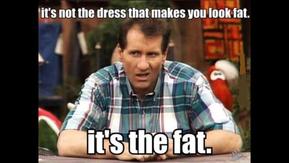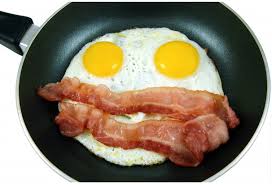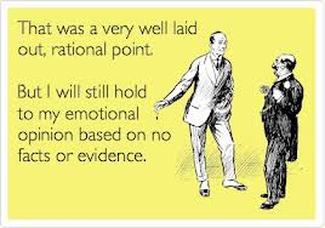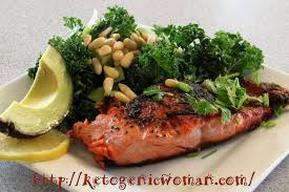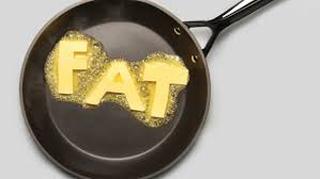
Why eating dietary fat doesn't make you fat, and why shedding your fat-phobia will make you shed body fat!
By Craven
Does anyone remember watching the tv show in the early '90's, Married With Children? If you do, then you'll know how quick-witted husband Al Bundy always had an insulting remark for everything. One of my favorite's from that show went something like this:
Peggy: "Al, does this dress make me look fat?"
Al: "Quit blaming the dress, it's the FAT that makes you look fat!"
I always get a good laugh out of that.
The reason I made that reference is because it reminds me of what I see happen everyday, and it goes something like this.
On a college campus, I get to observe the eating habits of a lot of young adults, and I always hear "I can't have that salad because there's cheese and ranch dressing on it and it'll make me fat. I'm going to get a fruit smoothie from Smoothie King instead, that's the healthy option!" (this person actually just opted out of a pretty decent meal with the salad to slamming about 100 grams of pure sugar in the smoothie. It's easy to see where this "freshman 15" comes from)
It's a bit of the stretch, but in regards to the dress comment, people are oblivious and a bit delusional about what is really happening. Sure it's easy to blame the dress for making you look fat, just as it's easy to blame the cheesy ranch salad for making you fat, but the reality is something much different.
Eating dietary saturated fat does NOT make you fat. Let that sink in.
Perhaps it's the name fat itself that tends to mislead people. The common thought is "butter and bacon are pure fat, if I eat them, that means I'll become fat."
Does anyone remember watching the tv show in the early '90's, Married With Children? If you do, then you'll know how quick-witted husband Al Bundy always had an insulting remark for everything. One of my favorite's from that show went something like this:
Peggy: "Al, does this dress make me look fat?"
Al: "Quit blaming the dress, it's the FAT that makes you look fat!"
I always get a good laugh out of that.
The reason I made that reference is because it reminds me of what I see happen everyday, and it goes something like this.
On a college campus, I get to observe the eating habits of a lot of young adults, and I always hear "I can't have that salad because there's cheese and ranch dressing on it and it'll make me fat. I'm going to get a fruit smoothie from Smoothie King instead, that's the healthy option!" (this person actually just opted out of a pretty decent meal with the salad to slamming about 100 grams of pure sugar in the smoothie. It's easy to see where this "freshman 15" comes from)
It's a bit of the stretch, but in regards to the dress comment, people are oblivious and a bit delusional about what is really happening. Sure it's easy to blame the dress for making you look fat, just as it's easy to blame the cheesy ranch salad for making you fat, but the reality is something much different.
Eating dietary saturated fat does NOT make you fat. Let that sink in.
Perhaps it's the name fat itself that tends to mislead people. The common thought is "butter and bacon are pure fat, if I eat them, that means I'll become fat."
It's not that simple, and definitely does not work that way. In fact, try using that logic with protein and carbs. "If I eat all that protein, ill get...protein?" or "If I eat all those carbs, I'll get...carby?" People willingly smash a large smoothie with 100 grams of carbs, but then are stricken with guilt just by even thinking about a slice of bacon!
It shouldn't be this way.
Let's start from bottom. Fat is one of the 3 major macro-nutrients, the other two you know as protein and carbohydrates.
Fat is no more detrimental to your body composition than protein or carbohydrates. What happens when you eat protein? Do you get fat? No. not in appropriate amounts, anyway.
What about carbohydrates? Do you get fat. NO. Again, not in appropriate amounts (there's a lot to be said on this issue, though, as carbs can be extremely detrimental to your overall health, especially the way Americans consume them.)
Somehow people have been trained to think dietary fat is immediately stored as fat cells and instantly makes you fatter. If this were really the case, we'd understand the mechanisms of how this works and transpose them to turn lead into gold! Talk about alchemy!
I think I've gotten this main point across so far, so let me explain a little bit about why a diet in moderate to high saturated fats is actually beneficial for your overall health.
It shouldn't be this way.
Let's start from bottom. Fat is one of the 3 major macro-nutrients, the other two you know as protein and carbohydrates.
Fat is no more detrimental to your body composition than protein or carbohydrates. What happens when you eat protein? Do you get fat? No. not in appropriate amounts, anyway.
What about carbohydrates? Do you get fat. NO. Again, not in appropriate amounts (there's a lot to be said on this issue, though, as carbs can be extremely detrimental to your overall health, especially the way Americans consume them.)
Somehow people have been trained to think dietary fat is immediately stored as fat cells and instantly makes you fatter. If this were really the case, we'd understand the mechanisms of how this works and transpose them to turn lead into gold! Talk about alchemy!
I think I've gotten this main point across so far, so let me explain a little bit about why a diet in moderate to high saturated fats is actually beneficial for your overall health.
What exactly is Fat?
Chemically, fats are triglycerides, triesthers of glycerols, and other fatty acids. Triglycerides? Glycerols? Sounds scary, huh? No wonder they just changed the name to FAT. These are all classified as lipid compounds, and your body effectively uses fat for energy.
We're fat adapted and constantly burning stored fat. As you sit there reading this, you are utilizing fat within your body. When you sleep, the fat burning continues. It may even increase according to some recent studies, but regardless, metabolic processes do NOT slow down when you sleep, especially fat burning.
Fat has a high energy (calorie) content, at 9 calories per gram, it makes it the most energy dense of the marco nutrients.
Chemically, fats are triglycerides, triesthers of glycerols, and other fatty acids. Triglycerides? Glycerols? Sounds scary, huh? No wonder they just changed the name to FAT. These are all classified as lipid compounds, and your body effectively uses fat for energy.
We're fat adapted and constantly burning stored fat. As you sit there reading this, you are utilizing fat within your body. When you sleep, the fat burning continues. It may even increase according to some recent studies, but regardless, metabolic processes do NOT slow down when you sleep, especially fat burning.
Fat has a high energy (calorie) content, at 9 calories per gram, it makes it the most energy dense of the marco nutrients.
So why is Fat good for me?
Before we can discuss this, you need to make a major paradigm shift. The old model of a carb-based diet is obsolete, just like that iphone 3 you got rid of and traded up for the latest model., Fats have made their way back (yes, there was once a time when Americans ate high amounts of fat) into our hearts! (figuratively, not literally. fat won't give you heart disease, i promise)
• Saturated fats positively affect hormonal function. Hormonal functions in your body are heavily dependent on enzymes in fatty acids
• Saturated fats help your tissues retain omega-3 fatty acids better and help convert them to useable forms of energy.
• Saturated fats strengthen our immune system.
• Saturated fats strengthen the liver.
• Saturated fats help your cholesterol profile and can help you live longer. Yup, studies have proven (and i can vouch for it first hand) than high fat dieters have lower triglyceride levels, increased HDL (good) cholesterol levels, and decreased LDL (bad) cholesterol levels.
Not too bad, right?
Before we can discuss this, you need to make a major paradigm shift. The old model of a carb-based diet is obsolete, just like that iphone 3 you got rid of and traded up for the latest model., Fats have made their way back (yes, there was once a time when Americans ate high amounts of fat) into our hearts! (figuratively, not literally. fat won't give you heart disease, i promise)
• Saturated fats positively affect hormonal function. Hormonal functions in your body are heavily dependent on enzymes in fatty acids
• Saturated fats help your tissues retain omega-3 fatty acids better and help convert them to useable forms of energy.
• Saturated fats strengthen our immune system.
• Saturated fats strengthen the liver.
• Saturated fats help your cholesterol profile and can help you live longer. Yup, studies have proven (and i can vouch for it first hand) than high fat dieters have lower triglyceride levels, increased HDL (good) cholesterol levels, and decreased LDL (bad) cholesterol levels.
Not too bad, right?
BUT YOU'RE GOING TO HAVE A HEART ATTACK!
The American Medical Association recently released a statement saying "Saturated fat is not associated with an increased risk of coronary heart disease, stroke, or coronary vascular disease."
That doesn't mean case closed on the issue, but eating a high saturated fat diet does not directly contribute to heart disease. Corrolation is not causation. The correlation here is that people who do suffer from heart disease ten to be overweight and extremely unhealthy, and typically consume a high fat AND high carbohydrate (overall caloric abundance) diet. Once again, the correlation between the disease and high fat is not a direct cause.
The United States Food and Drug Administration has their own idea of how you should eat, one that has no foundation in health studies or research whatsoever. You may be familiar with it.
The USFDA recommends a daily diet of 60% carbs, 20 percent fruits/veggies, 15-20% protein, and non almost non existent fats. Does that look right to you? If you possess any sort of rational thinking skills and a basic understanding of food, you'd know that this cannot be healthy. But people whole heatedly believe it.
60% calories from carbs. Not to mention the additional fruits. And you wonder why the obesity and diabetes epidemic has clenched onto our fat love handles, with no intention of letting up!
The recommendation is horrendous, but what baffles me is that are people that try base their diets to fit this model! Even the American Diabetes Association advocates this. In case you can't tell, this won't help cure diabetics, it will only exacerbate their illness and keep them in a sick state until they're in the grave!
Yet people still hold on to their morning bagel, fruit, glass of OJ, and bowl of oatmeal like it's the real cornestone of their day. From a pure biological standpoint to optimize your health and daily performance, that big carb-laden, sugary breakfast is pretty close to the worst thing you can put in your body, aside from a straight 3 pound bag of refined sugar, washed down with a frosty glass of hydrochloric acid! (That's a gross exaggeration, but you get what I'm saying.)
The USFDA recommends a daily diet of 60% carbs, 20 percent fruits/veggies, 15-20% protein, and non almost non existent fats. Does that look right to you? If you possess any sort of rational thinking skills and a basic understanding of food, you'd know that this cannot be healthy. But people whole heatedly believe it.
60% calories from carbs. Not to mention the additional fruits. And you wonder why the obesity and diabetes epidemic has clenched onto our fat love handles, with no intention of letting up!
The recommendation is horrendous, but what baffles me is that are people that try base their diets to fit this model! Even the American Diabetes Association advocates this. In case you can't tell, this won't help cure diabetics, it will only exacerbate their illness and keep them in a sick state until they're in the grave!
Yet people still hold on to their morning bagel, fruit, glass of OJ, and bowl of oatmeal like it's the real cornestone of their day. From a pure biological standpoint to optimize your health and daily performance, that big carb-laden, sugary breakfast is pretty close to the worst thing you can put in your body, aside from a straight 3 pound bag of refined sugar, washed down with a frosty glass of hydrochloric acid! (That's a gross exaggeration, but you get what I'm saying.)
Ketogenic Diets
I'd like to say a few things about ketogenic diets, as they are terribly misunderstood and strike fear deep into the hearts of your practicing health care professional and their whole government-regulated industry. For those who haven't heard the term ketogenic, you've probably heard of Atkins diets. Atkins is a type of ketogenic diet.
True ketogenic diets are HIGH fat, moderate protein, and zero carb. Eating fat and protein in this ratio changes the prefered energy mechanisms your body uses from carbohydrates to fat. In my personal experience, I'd like to say this about them:
They're phenomenal for straight fat loss. They're also great for providing mental clarity, as your brain performs cognitive functions exceptionally well when in ketosis. I managed to lose a considerable amount of body fat, FAST. and keep it off.
The major "fat phobia" in this country instantly causes people to think "HIGH FAT? NO CARBS? YOU'RE JUST ASKING TO GET SICK AND FAT."
From everything we've been told about nutrition, it seems counter intuitive, even downright stupid to eat almost pure fatty foods. But the scientific truth of the matter is, it works, and it will make you healthier.
here's a quick rundown why that is:
Depending on your specific fitness goals, and your current health levels, I'm reluctant to prescribe this type of diet to everyone, especially hard training individuals. They also take a considerable amount of dedication to stick to, as carbs are all around us (and deliciously addicting), so breaking a life long habit of toritllas with every meal is almost impossible for most people.
But if you have the will to do it, I highly recommend it to anyone who is looking to change their life for the better.
I'd also like to mention, they're a very powerful and effective tool for treating and preventing degenerative diseases such as Alzheimer's, Parkinson's, epilepsy, autism, depression, migraines, and cancer.
These diseases are dependent on the growth of damaged cells, and as I mentioned in my previous blog on Insulin, carbohydrates signal the release of insulin. With no insulin present in a ketogenic diet, these diseases are stopped dead in their tracks, and sometimes reversed.
I'd like to say a few things about ketogenic diets, as they are terribly misunderstood and strike fear deep into the hearts of your practicing health care professional and their whole government-regulated industry. For those who haven't heard the term ketogenic, you've probably heard of Atkins diets. Atkins is a type of ketogenic diet.
True ketogenic diets are HIGH fat, moderate protein, and zero carb. Eating fat and protein in this ratio changes the prefered energy mechanisms your body uses from carbohydrates to fat. In my personal experience, I'd like to say this about them:
They're phenomenal for straight fat loss. They're also great for providing mental clarity, as your brain performs cognitive functions exceptionally well when in ketosis. I managed to lose a considerable amount of body fat, FAST. and keep it off.
The major "fat phobia" in this country instantly causes people to think "HIGH FAT? NO CARBS? YOU'RE JUST ASKING TO GET SICK AND FAT."
From everything we've been told about nutrition, it seems counter intuitive, even downright stupid to eat almost pure fatty foods. But the scientific truth of the matter is, it works, and it will make you healthier.
here's a quick rundown why that is:
- With carbohydrates absent, blood glucose levels are constantly level. This means no insulin spikes from sugary meals that can lead to insulin resistance and disease such as diabetes
- Cholesterol levels improve and triglyceride levels decrease.
- Eating bacon, eggs, steak, butter, and my favorite, buttery bacon, never gets old!
Depending on your specific fitness goals, and your current health levels, I'm reluctant to prescribe this type of diet to everyone, especially hard training individuals. They also take a considerable amount of dedication to stick to, as carbs are all around us (and deliciously addicting), so breaking a life long habit of toritllas with every meal is almost impossible for most people.
But if you have the will to do it, I highly recommend it to anyone who is looking to change their life for the better.
I'd also like to mention, they're a very powerful and effective tool for treating and preventing degenerative diseases such as Alzheimer's, Parkinson's, epilepsy, autism, depression, migraines, and cancer.
These diseases are dependent on the growth of damaged cells, and as I mentioned in my previous blog on Insulin, carbohydrates signal the release of insulin. With no insulin present in a ketogenic diet, these diseases are stopped dead in their tracks, and sometimes reversed.
Get to the point, Make it quick
I'm not saying to go all cold turkey here and drop your carbs and adopt the all fat lifestyle, but it's important to incorporate and not be afraid of saturated fats in your diet. They're extremely beneficial for energy metabolism and for regulating your health and hormones. A brief rundown of foods with healthy fat to consume are:
One important thing to note is that when fats are increased, its important to observe your carbohydrate intake. Typically I recommend reducing carbs by 50 grams when increasing saturated fats. Eating BOTH high amounts of fat and carbs is a terrible idea, and that should have to go without saying, but I said it anyway. So don't do it.
Good or Bad Fat?
Saturated fats are good. Learn this. Live this.
People tend to categorize fats as "good" and "bad". Well that's all relative to context.
The only way a fat can be "bad" is if its hydrogenated, or a trans-fat. These are the type of oils used in fast food production; they're basically fats with added hydrogen to preserve their lifespan, but manipulating lipid profiles like so does not make the fat an ideal source.
Trans fats, along with vegetable oils (olive oil, canola oil, flax) have long been recommended as "healthy": oils to cook with. They may be lighter in caloric density, but have high amounts of Omega-6 fatty acids. It's not the worst thing in the world, but we weed a diet higher in Omega-3 fatty acids, or at the very least, an equal ratio of the two.
I'm not saying to go all cold turkey here and drop your carbs and adopt the all fat lifestyle, but it's important to incorporate and not be afraid of saturated fats in your diet. They're extremely beneficial for energy metabolism and for regulating your health and hormones. A brief rundown of foods with healthy fat to consume are:
- whole eggs
- beef (grass fed, preferably) of almost any cut
- chicken (dark and white meats)
- salmon
- grass fed butter
- coconut oil
- avacados
- milk/cheese products
- nut butters
- very limited amounts of olive and canola oils
One important thing to note is that when fats are increased, its important to observe your carbohydrate intake. Typically I recommend reducing carbs by 50 grams when increasing saturated fats. Eating BOTH high amounts of fat and carbs is a terrible idea, and that should have to go without saying, but I said it anyway. So don't do it.
Good or Bad Fat?
Saturated fats are good. Learn this. Live this.
People tend to categorize fats as "good" and "bad". Well that's all relative to context.
The only way a fat can be "bad" is if its hydrogenated, or a trans-fat. These are the type of oils used in fast food production; they're basically fats with added hydrogen to preserve their lifespan, but manipulating lipid profiles like so does not make the fat an ideal source.
Trans fats, along with vegetable oils (olive oil, canola oil, flax) have long been recommended as "healthy": oils to cook with. They may be lighter in caloric density, but have high amounts of Omega-6 fatty acids. It's not the worst thing in the world, but we weed a diet higher in Omega-3 fatty acids, or at the very least, an equal ratio of the two.
Take Home Points
- Eating fat will not make you fat. What contributes to fat gain is over-eating all three macro nutrients and putting your body in a caloric surplus, allowing you to gain fat.
- Saturated fat is not a direct cause to heart disease and will actually improve cholesterol levels.
- It's flat out delicious.
- Fish oil is an excellent way to supplement your diet with Omega-3 Fatty Acids (the kind you want) if eating meat is not your favorite thing to do.. I recommend everyone supplement with fish oils.
- Learn how to track your macronutrients and calories. This helps you understand what and how much you're actually eating, and can make eating more enjoyable.
What's Next?
If you've read my last few blogs, I've started to build a foundation for a model program that I impliment in my life and on people around me. Basic fundamental knowledge of roles of insulin, carbohydrates, and fats are important to know to make the most of what's to come.
I hope most of what I've discussed has been of some benefit and can help you make more informed food choices and expedite your journey on the gainz train!
If you've read my last few blogs, I've started to build a foundation for a model program that I impliment in my life and on people around me. Basic fundamental knowledge of roles of insulin, carbohydrates, and fats are important to know to make the most of what's to come.
I hope most of what I've discussed has been of some benefit and can help you make more informed food choices and expedite your journey on the gainz train!
References:
1. Volek, JS. Testosterone and cortisol in relationship to dietary nutrients and resistance exercise. Journal of Applied Physiology, Jan, 1999, 82
2. Garg, M L, Federation Of American Societies for Experimental Biology (FASEB) Journal, 1988, 2:4, "Meeting Abstracts,"American Oil Chemists Society Proceedings, May 1998, 7, Chicago, Il.
3. Emken EA, Dietary linoleic acid acid influences desaturation and acylation of deuterium-labeled linoleic and linolenic acids in young adult males. Biochemical Biophysical Acta, Aug 4, 1994; 1213 (3) 277-278
4. Kabara, J J, The Pharmacological Effects Of Lipids, The American Oil Chemists Society, Champaign, IL, 1978, 1-14. Cohen, L A, Journal of the National Cancer Institute, 1986, 77:43
5. USDA National Database Nutrient Database for Standard Reference.
